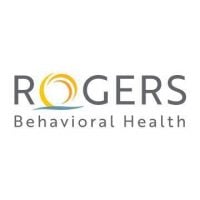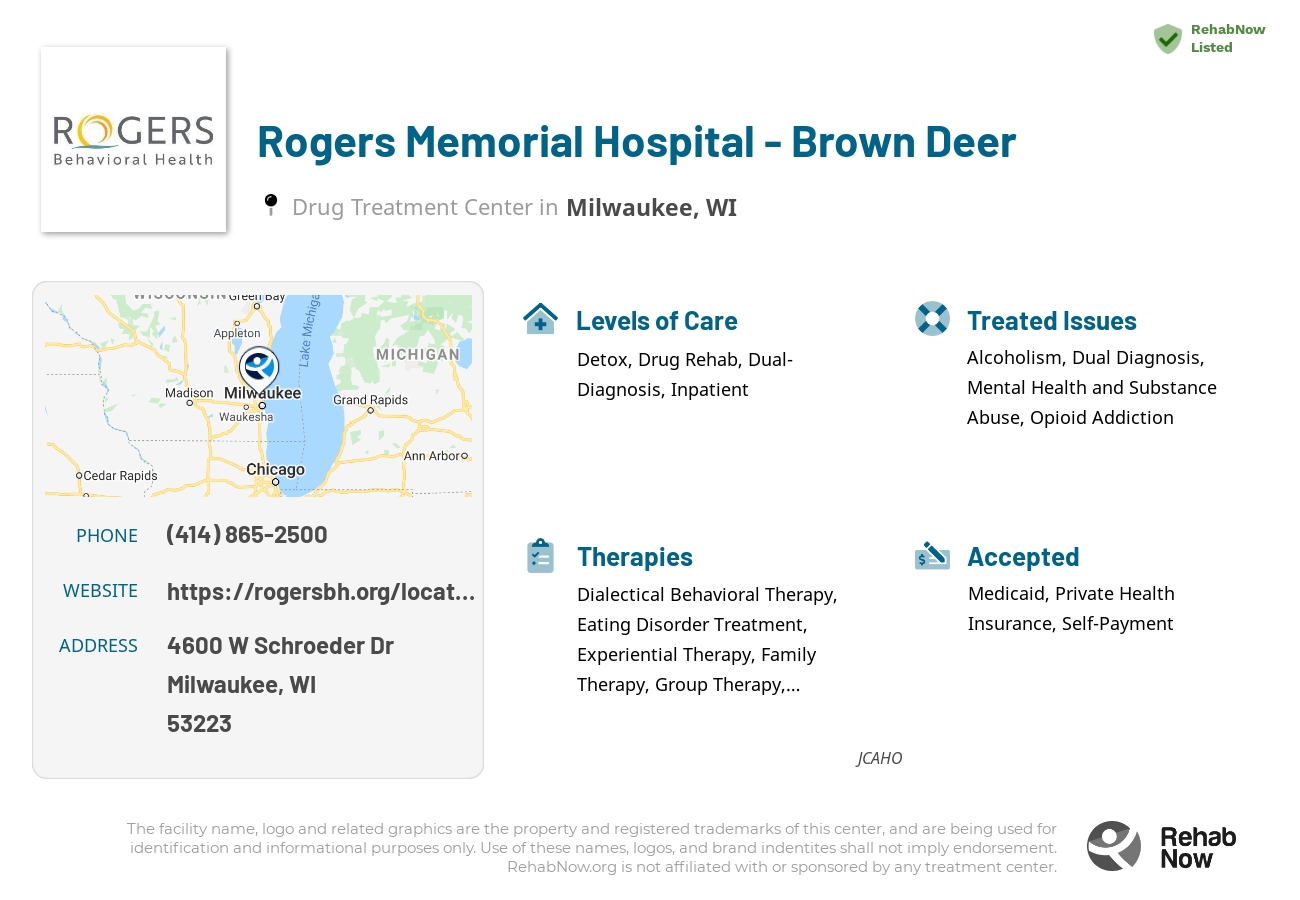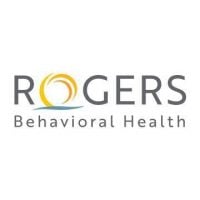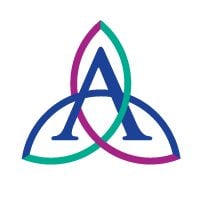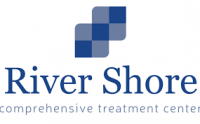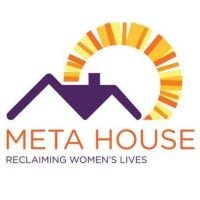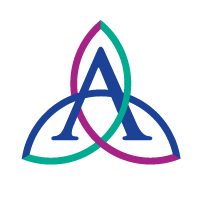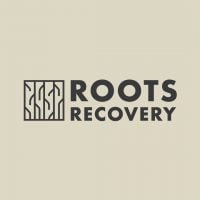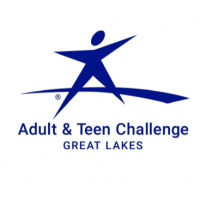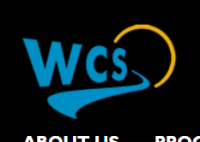Rogers Memorial Hospital - Brown Deer
Drug Rehab Center in Milwaukee, Wisconsin
Rogers Memorial Hospital - Brown Deer is a JCAHO accredited 56-bed facility that offers comprehensive drug rehab programs tailored to individuals with evidence-based therapies such as Cognitive Behavioral Therapy (CBT), Dialectical Behavior Therapy (DBT), 12 Step Work, and Trauma Informed Care, as well as holistic activities like yoga and mindfulness meditation, to help improve physical and emotional health.
About This Wisconsin Facility
Rogers Behavioral Health - Brown Deer Main Campus in Milwaukee, WI provides specialized addiction treatment services in an inpatient setting. Established in 1907, this facility focuses on evidence-based care for individuals struggling with substance abuse and mental health disorders.
As a private, not-for-profit provider, Rogers Behavioral Health offers comprehensive treatment programs tailored to the unique needs of each patient. Their approach emphasizes holistic recovery through a range of therapeutic interventions and counseling services.
Accredited by the Joint Commission on Accreditation of Healthcare Organizations (JCAHO), Rogers Behavioral Health - Brown Deer Main Campus offers a 56-bed inpatient facility. Treatment options include detoxification, drug rehabilitation, dual-diagnosis care for co-occurring mental health conditions, as well as partial hospitalization and outpatient programs.
- Specialized treatment for addiction and mental health disorders
- Evidence-based, holistic approach to recovery
- Comprehensive inpatient and outpatient services
This facility addresses a wide range of substance abuse issues, including alcoholism, opioid addiction, drug addiction, and eating disorders. Their programs are designed to support individuals at various stages of recovery, from initial detoxification to long-term maintenance.
For individuals struggling with opioid addiction, Rogers Behavioral Health - Brown Deer Main Campus provides a structured inpatient program. Through a combination of medical supervision, counseling, and therapeutic interventions, patients receive the support they need to overcome their addiction and develop coping strategies for lasting recovery.
Genders
Ages
Modality
Additional
Accreditations

JCAHO
Conditions and Issues Treated
A drug abuser needs help because if no one helps them, they will not leave their vicious circle.
People who abuse drugs are likely to suffer from an addiction, which can cause serious health problems. It can also cause quarrels with people around them. It is common for drug abusers to have difficulty holding down jobs or relationships, but sometimes people around them can be quite tolerant. There are cases where the families of the drug abusers do not want to see them get any help, and the subject becomes controversial.
When it comes to helping drug abusers get sober, there are many options to choose from. It is essential to state that there is no “correct” way of doing things. People are different, and they need different types of help to get over their addiction.
Opioid addiction treatment should be done in a medically supervised drug rehab. Opioid addiction treatment will include detoxification and drug rehab counseling to help both the user and their loved ones learn how to live a successful sober lifestyle. Methadone, buprenorphine, and naltrexone are three medications that can help treat opioid addiction. Individual drug rehab counseling sessions can be helpful to discuss any questions or concerns with the drug treatment program.
When addiction and psychiatric issues co-occur, the addict’s recovery is more successful when both conditions are treated. A dual diagnosis refers to a condition in which the patient is diagnosed with two health issues: addiction and bipolar disorder.
Usually, dual diagnosis sufferers are prescribed a combination of treatments for each condition. The most common therapies are psychotherapy, behavioral therapy, spiritual counseling, 12-step programs, and medication management.
Psychiatric conditions are an obstacle to recovery because they can create roadblocks to a healthy lifestyle. Drugs and alcohol may be used as a means of self-medication, which can have dangerous consequences. Over time, addicts build up a tolerance and suffer withdrawal symptoms when drug use is stopped.
With the proper treatment, dual diagnosis sufferers can overcome their conditions and achieve lasting sobriety.
Levels of Care Offered at Rogers Memorial Hospital - Brown Deer
This center offers a variety of custom treatment tailored to individual recovery. Currently available are Detox, Drug Rehab, Dual-Diagnosis, Inpatient, Outpatient, Partial-Hospitalization, with additional therapies available as listed below.
Detoxification is the first step in drug addiction treatment. A controlled environment where symptoms can be managed with medication and close observation is provided by drug detoxification. Detoxification is an essential step in the recovery process, but it is also one of the most dangerous. Due to the potential danger, it’s critical to understand what detoxification is and how to complete it safely.
A detox program helps the person physically withdraw from drugs and helps them track their progress. So, suppose the person isn’t ready for sobriety (or relapses). In that case, the treatment professionals can catch it early and help re-orient them towards recovery.
Inpatient treatment is an option that provides addicts with a supportive environment in which they can stop using. This type of intensive care and supervision is appropriate for those who were unable to quit on their own or need more structure than they could get from outpatient treatment, such as the addict most in need of this level of care.
The goal of inpatient rehab is for the addict to stay focused on sobriety and remain free of mood altering substances. Inpatient treatment programs usually offer the following: detox, therapy groups, one-on-one counseling, medication management and aftercare planning.
Individuals struggling with drug addictions can get help from several treatment options, including inpatient and outpatient programs. Outpatient drug treatment programs can also provide patients with different levels of care, usually depending on the patient’s degree of addiction.
At an outpatient program in Milwaukee, a patient will attend a recovery program during the day and return home in the evening. Suppose a patient is struggling with drug addiction. In that case, an outpatient program can serve as an effective transition point during the recovery process.
Partial Hospitalization Program is when a person in rehab takes part in regular treatment sessions, at least five days per week (and sometimes six), during all or most hours of the day, at Rogers Memorial Hospital - Brown Deer. These programs vary in length, but they can last anywhere from one month to three months—or longer.
This is done through the use of a method called “therapeutic community.” PHPs are very intense, and they are best for individuals who have completed a successful, medically supervised withdrawal.
Therapies & Programs
Family therapy is a crucial part of drug treatment and getting sober. It is one of the most effective ways to help addicts stay on the path to long-term sobriety. When a drug addict decides that they want to try and get sober, it takes the support of every person they love to succeed. It can be incredibly difficult for loved ones to watch an addict go through the pain and suffering of withdrawal, but by being there with them and supporting them, they can help to make sure that the addiction never returns.
One of the most important parts of family therapy is the relapse prevention plan. During treatment, therapists and doctors will often sit down with the addict and their family to develop a plan in case the addict ever feels like they want to use again. This plan should involve steps the addict and family can take together to prevent them from relapsing in the future. An addict’s family can play a vital part in helping them to avoid relapse because they can spot the warning signs and help them get back on track before it becomes too much of a problem.
Group therapy helps prevent addicts from feeling isolated or unique in their situation by offering a sense of comfort and fellowship. It also creates a forum for addicts to build their support systems and learn from each other. The group therapy sessions at Rogers Memorial Hospital - Brown Deer occur in a group setting rather than one-on-one to create a safer, controlled environment where addicts feel comfortable.
Trauma therapy helps people dealing with addiction by allowing them to confront the traumas of their past and move past them. It is important to note that trauma therapy should not be confused with PTSD (post-traumatic stress disorder) Rather, it is used to treat the effects of trauma, which are often at the root of addiction.
Dialectical Behavior Therapy was developed in the 1980s to treat chronically suicidal individuals. It is a cognitive-behavioral therapy that combines strategies derived from Zen Buddhism, such as mindfulness training. DBT has been adapted for use with other types of psychiatric problems, including substance abuse and personality disorders. DBT aims to help patients change their thinking and behavior, instead of relying on medication.
Cognitive Behavioral Therapy (CBT) is a common therapeutic approach to help drug addicts. It teaches addicts new ways of thinking and behaving so that they can avoid relapse. There are several forms of CBT used in drug rehabilitation centers.
Cognitive Restructuring helps addicts identify faulty, negative thinking so that they can work together with the therapist to find healthier ways of thinking, resulting in better decision-making.
Cognitive Behavioral Therapy for Addiction uses the principles of CBT to help treat addiction. It focuses on specific aspects of each person’s thinking, feeling, physiology, and behavior. It aims to identify specific problems in these areas and create a personalized treatment strategy.
Drug addiction can be a difficult thing to overcome, but with the help of nutrition therapy, it can become a little bit easier. Nutrition therapy provides addicts with the nutrients they need to recover both physically and mentally. This type of therapy also helps addicts to have more energy and strength to fight cravings. Most importantly, good nutrition helps to keep addicts strong against the physical symptoms of withdrawal.
Nicotine replacement therapies are effective because they provide you with the nicotine you are addicted to without inhaling carcinogens from cigarettes. Some types of NRT include nicotine gum, nicotine patches (transdermal systems), nasal spray, and lozenges. The benefits of using NRT can include reducing the risk of heart disease and cancer.
Patient Experience
Creative Arts
Creative arts therapy is an expressive process that helps people heal. Even if the goal isn’t always to create a finished product, it’s therapeutic for many. They can express themselves through journaling or other creative outlets like sketching, painting, sculpting, etc. This helps them cope with stress and anxiety better than before (and even when they were). The activity improves communication skills and the ability to process traumatic events from one’s past, often triggered during periods of withdrawal/relapse.
Experiential Therapy at Rogers Memorial Hospital - Brown Deer
Experiential Therapy is a new approach to addiction treatment. Addiction-related psychological issues like depression and anxiety are addressed through physical activities.
Experiential Therapy can help those who have struggled with past traumas or life decisions like drug use. It allows people to gain new perspectives on their behavior patterns by recreating experiences in healthy ways rather than continuing old habits that may no longer serve them well.
Payment Options Accepted
For specific insurance or payment methods please contact us.
Is your insurance accepted?
Ask an expert, call (888) 674-0062
Rogers Behavioral Health Associated Centers
Discover treatment facilities under the same provider.
- Rogers Behavioral Health - Appleton in Appleton, WI
- Rogers Behavioral Health - Brown Deer Outpatient Center in Milwaukee, WI
- Rogers Behavioral Health - Kenosha in Kenosha, WI
Learn More About Rogers Behavioral Health Centers
Additional Details
Specifics, location, and helpful extra information.
Milwaukee, Wisconsin 53223 Phone Number(414) 865-2500 Meta DetailsUpdated April 15, 2024
Staff Verified
Patient Reviews
There are no reviews yet. Be the first one to write one.
Milwaukee, Wisconsin Addiction Information
Wisconsin has some of the highest rates in the United States for both adolescent and adult substance abuse. Since 2009, the state has been experiencing the same escalating rates of drug abuse and addiction as the rest of the country. The major concerns are the misuse of prescription painkillers and the escalating number of deaths due to alcohol-related liver disease.
Drug abuse is a growing problem in Milwaukee, Wisconsin, and the statistics are alarming. Treatment admissions for opiate addiction have increased by 400% over the past 10 years. Drug overdoses are now the leading cause of death for people aged 25-44. There are various drug treatment options available for someone looking to get sober in Milwaukee, Wisconsin. Some of the most common treatments include inpatient rehab, outpatient rehab, and therapy.
Treatment in Nearby Cities
- Burlington, WI (38.5 mi.)
- Pewaukee, WI (15.6 mi.)
- Friendship, WI (107.3 mi.)
- Bay City, WI (243.5 mi.)
- Onalaska, WI (170.8 mi.)
Centers near Rogers Memorial Hospital - Brown Deer
The facility name, logo and brand are the property and registered trademarks of Rogers Memorial Hospital - Brown Deer, and are being used for identification and informational purposes only. Use of these names, logos and brands shall not imply endorsement. RehabNow.org is not affiliated with or sponsored by Rogers Memorial Hospital - Brown Deer.
